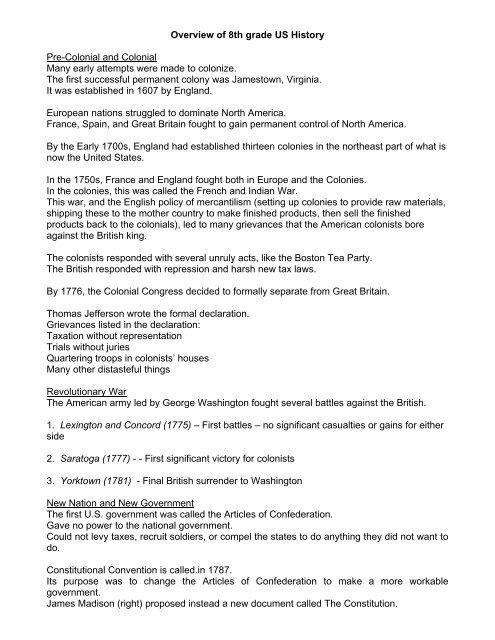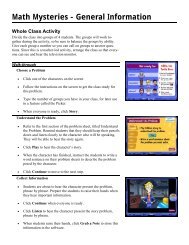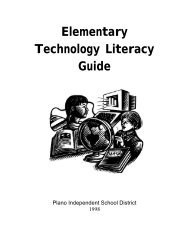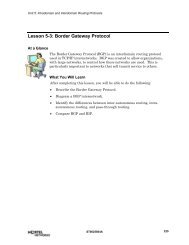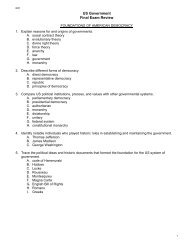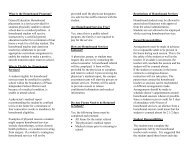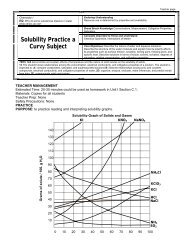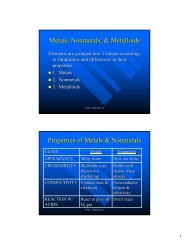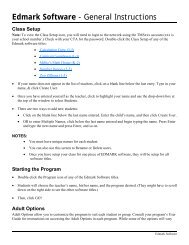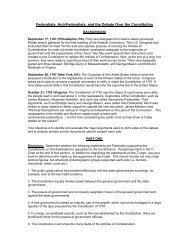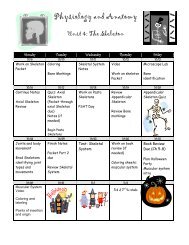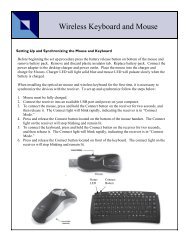Overview of 8th grade US History
Overview of 8th grade US History
Overview of 8th grade US History
Create successful ePaper yourself
Turn your PDF publications into a flip-book with our unique Google optimized e-Paper software.
<strong>Overview</strong> <strong>of</strong> <strong>8th</strong> <strong>grade</strong> <strong>US</strong> <strong>History</strong><br />
Pre-Colonial and Colonial<br />
Many early attempts were made to colonize.<br />
The first successful permanent colony was Jamestown, Virginia.<br />
It was established in 1607 by England.<br />
European nations struggled to dominate North America.<br />
France, Spain, and Great Britain fought to gain permanent control <strong>of</strong> North America.<br />
By the Early 1700s, England had established thirteen colonies in the northeast part <strong>of</strong> what is<br />
now the United States.<br />
In the 1750s, France and England fought both in Europe and the Colonies.<br />
In the colonies, this was called the French and Indian War.<br />
This war, and the English policy <strong>of</strong> mercantilism (setting up colonies to provide raw materials,<br />
shipping these to the mother country to make finished products, then sell the finished<br />
products back to the colonials), led to many grievances that the American colonists bore<br />
against the British king.<br />
The colonists responded with several unruly acts, like the Boston Tea Party.<br />
The British responded with repression and harsh new tax laws.<br />
By 1776, the Colonial Congress decided to formally separate from Great Britain.<br />
Thomas Jefferson wrote the formal declaration.<br />
Grievances listed in the declaration:<br />
Taxation without representation<br />
Trials without juries<br />
Quartering troops in colonists’ houses<br />
Many other distasteful things<br />
Revolutionary War<br />
The American army led by George Washington fought several battles against the British.<br />
1. Lexington and Concord (1775) – First battles – no significant casualties or gains for either<br />
side<br />
2. Saratoga (1777) - - First significant victory for colonists<br />
3. Yorktown (1781) - Final British surrender to Washington<br />
New Nation and New Government<br />
The first U.S. government was called the Articles <strong>of</strong> Confederation.<br />
Gave no power to the national government.<br />
Could not levy taxes, recruit soldiers, or compel the states to do anything they did not want to<br />
do.<br />
Constitutional Convention is called.in 1787.<br />
Its purpose was to change the Articles <strong>of</strong> Confederation to make a more workable<br />
government.<br />
James Madison (right) proposed instead a new document called The Constitution.
Written with several principles in mind:<br />
1. Limited Government<br />
2. Republicanism<br />
3. Checks and Balances<br />
4. Separation <strong>of</strong> Powers<br />
5. Popular Sovereignty<br />
6. Individual Rights<br />
1. Limited Government<br />
The ruler is subject to the law.<br />
Came from the Magna Carta (1215).<br />
2. Republicanism<br />
It was borrowed from the Ancient Romans.<br />
A philosophy <strong>of</strong> limited government in which elected representatives serve at the will <strong>of</strong> the<br />
people.<br />
Examples<br />
State legislatures<br />
Congress<br />
3. Checks and Balances<br />
From the French author Montesquieu<br />
No part <strong>of</strong> the government has too much power over the others.<br />
Each part is checked by the other parts.<br />
Examples:<br />
Judicial branch can declare a law unconstitutional<br />
Legislative branch can override presidential veto with a 2/3 vote<br />
Executive branch can veto law<br />
Legislative branch can remove judges from <strong>of</strong>fice<br />
4. Separation <strong>of</strong> Powers<br />
Montesquieu, again<br />
Government should be separated into branches. (get it?)<br />
Ours has three: Legislative (making laws) Executive (enforcing laws) and Judicial<br />
(interpreting laws).<br />
5. Popular Sovreignty<br />
This word comes from various English philosophers such as:<br />
John Locke, Thomas Hobbes and Jean-Jacques Rousseau.<br />
“Popular” means people.<br />
“Sovereignty” comes from “sovereign” which means ruler.<br />
Popular sovereignty = people choose<br />
6. Individual Rights<br />
The basic liberties that all people are entitled (by God or nature) to certain rights<br />
From John Locke: life, liberty and property<br />
These liberties are guaranteed in the first 10 amendments to the Constitution, the Bill <strong>of</strong><br />
Rights<br />
The foundations <strong>of</strong> these ideas can be found in the English Bill <strong>of</strong> Rights.<br />
Individual rights have been extended through subsequent amendments to the Constitution.
When it came time to vote on the Constitution, there was a fight.<br />
Federalists<br />
Led By James Madison, John Jay and Alexander Hamilton<br />
Favored the Constitution.<br />
Wrote the Federalist Papers in support <strong>of</strong> ratification <strong>of</strong> the Constitution.<br />
Anti-Federalists<br />
Led By Patrick Henry (right).<br />
Felt the Constitution gave too much power to a far-away central government.<br />
Favored the addition <strong>of</strong> a Bill Of Rights.<br />
The Constitution was ratified.<br />
The Bill Of Rights was added soon after.<br />
The first ten amendments to the Constitution<br />
Largely limited what the federal government could do in terms <strong>of</strong> infringing on rights.<br />
First Amendment<br />
Freedom <strong>of</strong> speech, press, assembly, religion, and petition<br />
Vital in a democratic society<br />
Second Amendment<br />
the right to keep and bear arms<br />
Third Amendment<br />
The government may not quarter troops in private homes without permission.<br />
Fourth Amendment<br />
Right to be secure in your property, person, and papers<br />
Police need a warrant in order to search or arrest.<br />
Fifth Amendment<br />
No double jeopardy<br />
Right to remain silent<br />
Right to due process <strong>of</strong> law<br />
Sixth Amendment<br />
Right to speedy trial<br />
Right to confront witnesses<br />
Seventh Amendment<br />
Right to trial by jury in civil cases (someone suing someone else)<br />
Eighth Amendment<br />
No cruel and unusual punishment<br />
Or excessive bail or fines<br />
Ninth Amendment<br />
Rights not listed are reserved to the people (Right to privacy included here)<br />
Tenth Amendment<br />
Powers not granted to the federal government are reserved to the states.
This division <strong>of</strong> power between the state and national government is called Federalism.<br />
State Powers<br />
•provide for education<br />
•conduct elections<br />
•provide public safety<br />
•regulate trade in state<br />
National Powers<br />
•maintain armed forces<br />
•coin money<br />
•declare war<br />
•make foreign policy<br />
Powers Shared by National and State Governments<br />
•raise taxes<br />
•administer criminal justice<br />
•provide for public welfare<br />
•charter banks<br />
•borrow money<br />
Historically, there have been several major conflicts over the rights <strong>of</strong> states.<br />
The Nullification Crisis<br />
The election <strong>of</strong> Andrew Jackson ushered in the era <strong>of</strong> the “common man.”<br />
In 1832, President Jackson threatened to send the army to South Carolina to prevent the<br />
state from disobeying (nullifying) a federal tariff law.<br />
Civil War<br />
Crusades to end slavery, the abuse <strong>of</strong> alcohol, and subjection (being under the authority) <strong>of</strong><br />
women to men also played an important part in making society better.<br />
Writers, artists, and religious leaders also joined in to bring attention to American social<br />
issues (ex: Henry David Thoreau). Henry David Thoreau advocated that people challenge<br />
laws they considered unjust by refusing to obey them. The process <strong>of</strong> defying codes <strong>of</strong><br />
conduct within a community or ignoring the policies and government <strong>of</strong> a state or nation when<br />
the civil laws are considered unjust is known as civil disobedience.<br />
Civil Disobedience (noun)-Refusal to obey civil laws in an effort to induce change in<br />
governmental policy or legislation, characterized by the use <strong>of</strong> passive resistance or other<br />
nonviolent means.<br />
On April 12,1861, Ft. Sumter, in Charleston Harbor, South Carolina was attacked.<br />
It was a “bloodless opening to the bloodiest war in American history”.<br />
The winds <strong>of</strong> war howled and the U.S. Civil War began.<br />
People from every walk <strong>of</strong> life were faced with the choice... North or South. Some families<br />
were split with sons on both sides.<br />
Many battles were fought with death and destruction on both sides.
The winds <strong>of</strong> war whipped across the nation. The land, the hearts and soul <strong>of</strong> the nation were<br />
ripped apart.<br />
On January 1, 1863, Lincoln issued the Emancipation Proclamation, a formal order declaring<br />
slaves in Confederate states to be free.<br />
“The time came when I felt that slavery must die so that the nation might live.”<br />
The struggle for power ended on April 9, 1865, at Appomattox Courthouse, Virginia. Union<br />
General U.S. Grant accepted a surrender from Confederate General Robert E. Lee to end the<br />
war.<br />
Radical Republicans had their own plan for Reconstruction.<br />
The Reconstruction Act <strong>of</strong> 1867:<br />
Divided the South into 5 military districts<br />
New Southern constitutions had to be written<br />
Guaranteed freedmen (former slaves) citizenship<br />
Guaranteed freedman voting rights<br />
13th Amendment- freed all slaves<br />
14th Amendment- defined citizenship and extended it to blacks<br />
15th Amendment-gave blacks the right to vote<br />
By 1877, the post-war era (called “reconstruction”) ended, and gave way to the Industrial Era.<br />
The Industrial Revolution and Westward Expansion<br />
Industrial Revolution contributed to westward expansion.<br />
The invention <strong>of</strong> the steam engine provided cheaper, and faster transportation. Steam power<br />
also allowed for factories to be built anywhere, including the West.<br />
The Industrial Revolution and westward expansion brought about rapid change.<br />
Organized efforts to reform society for the better began with much enthusiasm.<br />
Not all Americans saw the Industrial Revolution and Westward expansion as positive aspects<br />
<strong>of</strong> society.<br />
Reform movements for schools, prisons, and hospitals swept the country.


